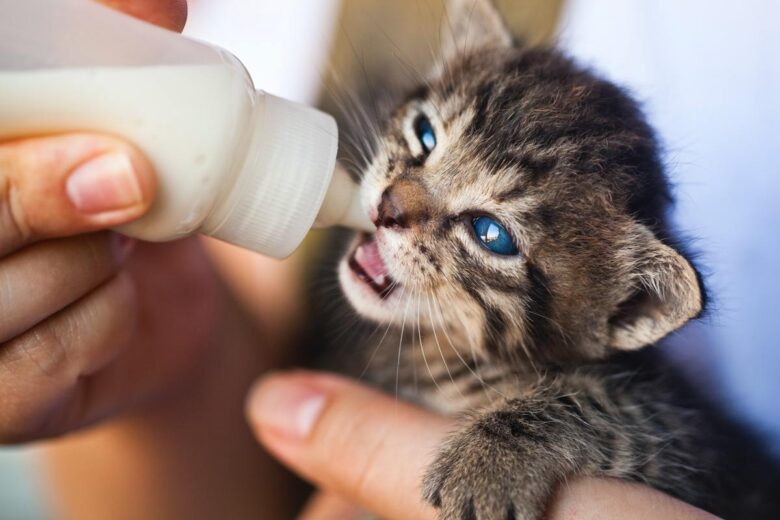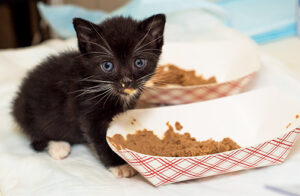Of course, caring for kittens is fun and adorable, but it can also be difficult sometimes. Cat lovers, no matter how long they have owned cats, are likely to make mistakes that damage their health and happiness. Don’t make these five mistakes when caring for your baby. They will help him grow into a healthy, happy adult cat.
1. Inadequate Nutrition:
Mistake: Feeding kittens adult cat food or poor-quality kitten food.
Kittens have very different needs than adult cats when it comes to food. To keep up with their rapid growth and development, they need more proteins, amino acids and vitamins. If you feed low-quality adult cat food or kitten food, they may become malnourished and not grow properly.
How to Prevent It: Always choose high-quality kitten food and follow the rules of the Association of American Feed Control Officials (AAFCO). For kittens, make sure the food is intended for them. It will have the right combination of nutrients for its growth. To meet your kitten’s high energy needs, you can feed her several small meals throughout the day.
2. Not Paying Attention to Training and Social Interaction:
Mistake: Not providing enough social interaction or starting training too late.
Between the ages of two and seven weeks, kittens go through a very important socialization phase. This is when they learn to interact with people and other animals. If you miss this time, your cat may become scared or angry.
How to Prevent It: Get your kitten used to different people, animals and places immediately. It is important to be gentle and have good interactions during this time. Once you bring your kitten home, teach her how to use the litter box and provide her with toys and a scratching post. With regular exercise and socialization, your baby will become a well-adjusted adult cat.
3. Not Receiving Preventative Medical Care:
Mistake: Not taking your hats to the vet in time, or not condemning them or treating them against parasites.
Kittens can develop many health problems, such as parasites and infectious diseases. Delaying medical treatment can lead to serious health problems.
How to Prevent It: Take your baby to the vet as soon as possible after an infection. Your vet will set up an injection schedule and provide advice on how to protect your pet from escaping ticks and worms. You should take your kitten to the vet regularly to monitor its health and detect any problems early.
4. Not Realizing the Importance of Play:
Mistake: Not providing enough playtime and stimulation.
Cats and kittens need regular play to stay physically and mentally healthy. If you don’t give them enough to do, they will get bored and do bad things.
How to Prevent It: To keep your kitten’s hunting instincts alive, give her toys that resemble real animals, such as feather sticks and mouse toys. Playing with your kitten can release her energy and strengthen the bond between the two of you. Be sure to rotate toys to keep your kitten interested.
5. Ignoring Litter Box Issues:
Mistake: The mistake is that the litter box is not kept clean or that the litter box is too big or too small.
If the litter box is dirty, kittens may not want to use it, which can lead to accidents in the home. A litter box that is too big or too small can be scary or uncomfortable for your kitten.
How to Prevent It: To prevent this, clean the litter box daily and replace the litter regularly to keep it fresh. Kittens must be able to get in and out of the box quickly. Make sure it is easy to reach and the right size. If you have more than one cat, make sure each cat has its own litter box and an extra litter box.
Conclusion:
Adopting a kitten is a big responsibility that requires careful attention to detail and a deep understanding of their needs. By avoiding these common mistakes, you can provide your kitten with a safe and caring environment. Caring for kittens involves providing them with adequate food, being socialized, receiving medical care, playing, and knowing how to use the litter box. If you take care of these things, your baby will grow up to be a healthy, happy adult cat.
When caring for kittens, remember that every action you take is an opportunity to bond with them and ensure their health. If you don’t make these mistakes, you and your partner will live a long, happy, and healthy life together.
FAQs:
1. How is kitten food different from adult cat food?
The ingredients in kitten food have been specially selected to help kittens grow and develop quickly. Compared to adult cat food, kitten food contains more protein, important amino acids and vitamins to meet the high energy and nutritional needs of kittens.
2. Why is it important for kittens to meet new friends? When should we start?
Kittens need socialization to learn how to be confident around people, other animals and their environment. Early on, preferably between two and seven weeks of age, so that behavioral problems such as anxiety or anger do not return.
3. What is the most important step when taking a new pet to the vet?
Developing a vaccination schedule, an initial examination and a parasite prevention plan (fleas, ticks and worms) are all important steps in veterinary care. Regular visits to the vet are important to monitor your pet’s health and detect any problems early.
4. How can I ensure that my kitten gets enough play and stimulation?
To keep your kitten’s hunting instincts active, give her toys that resemble real animals, such as feather wands and mouse toys. Make sure you play with your kitten every day to keep him from getting bored, burn off some energy, and improve your relationship with him.
5. What’s the best way to keep your puppy’s litter box clean?
Scoop out the litter box every day and replace it regularly to keep it clean. Make sure the litter box is the right size for your kitten, is easily accessible, and is in a safe, quiet place. You can also prevent problems by having one more litter box in the house than your cat.



